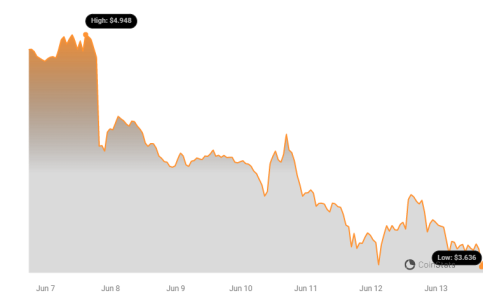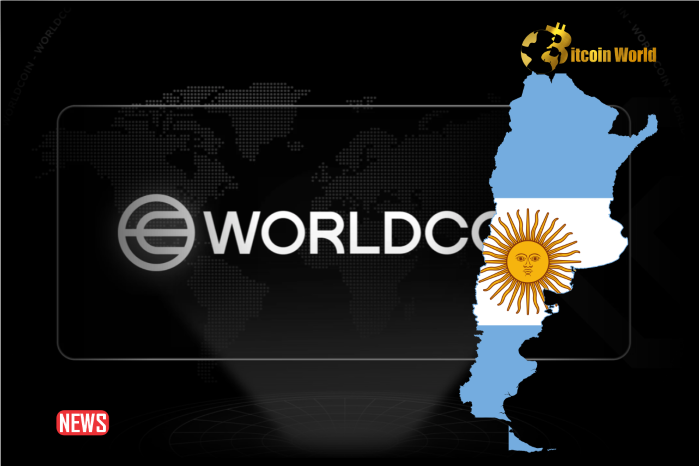Argentina has become a hotbed for Worldcoin (WDC), with long queues forming as Argentines eagerly seek their share of ‘free’ crypto. But beneath the surface of this digital gold rush, a less visible market has emerged: Worldcoin resellers. These unofficial intermediaries are now attracting the attention of Argentinian regulators, raising questions about the future of Worldcoin’s operations in the country. Let’s dive into why Argentina is scrutinizing these resellers and what it means for everyone involved.
Why are Argentina Regulators Targeting Worldcoin Resellers?
As iPro Up reports, some Argentines have ingeniously become Worldcoin “resellers” to supplement their income. This involves purchasing Worldcoin tokens (WLD) from individuals who have scanned their irises at Worldcoin centers, offering them immediate cash or bank deposits in exchange for control of their crypto wallets.
Think of it as a crypto cash-for-tokens exchange operating outside the traditional financial system. This burgeoning reseller market has placed these individuals “in the crosshairs” of Argentina’s financial watchdogs, specifically the National Securities Commission (CNV) and the Federal Administration of Public Revenues (AFIP), the nation’s tax authority.
The Worldcoin Phenomenon in Argentina: A Quick Recap
Worldcoin’s popularity in Argentina has been nothing short of remarkable. Driven by the promise of free WLD tokens, Argentines have flocked to iris-scanning locations. But instead of holding onto these digital assets or trading them on regulated crypto exchanges, many are opting for quick cash.

This preference for immediate liquidity has fueled the rise of “resellers.” They essentially act as unofficial exchanges, offering cash for WLD tokens. However, this service comes at a cost, with resellers often charging hefty commission fees, sometimes as high as 50% of the token’s value.
The Reseller Ecosystem: How Does it Work?
Resellers don’t operate in isolation. They often collaborate with “coleros.” In Argentina, coleros are individuals who are paid to wait in lines – and in this context, they wait in Worldcoin queues. These coleros play a crucial role in connecting resellers with potential sellers, often convincing people in line to utilize the resellers’ services once they receive their WLD tokens.
According to reports, a significant portion of individuals obtaining Worldcoin tokens are unfamiliar with cryptocurrency exchanges and the process of converting WLD to Argentinian Pesos. This knowledge gap creates an opportunity for resellers and coleros to step in, offering a seemingly convenient solution – albeit at a significant cost.
Why Regulators are Concerned: Is it Illegal?
While the act of reselling Worldcoin itself isn’t inherently illegal, the way these operations are conducted is raising red flags. The core issue is that these transactions are largely happening outside the formal financial system. According to iPro Up, while these “operations” are “not illegal,” they are expected to “go through the financial system.”
Here’s a breakdown of the key regulatory concerns:
- Tax Implications: The Argentine legal system views the “conversion” of WLD tokens into fiat pesos as a business transaction. Large-scale reseller operations, dealing with numerous users, can be classified as unofficial businesses, making them liable for taxes. Authorities like AFIP are keen to ensure these transactions are properly taxed.
- Unofficial Crypto Exchanges: The CNV, Argentina’s securities regulator, is scrutinizing whether resellers are effectively operating as unlicensed crypto exchanges. New regulations mandate that domestic crypto exchanges must obtain operating permits and adhere to strict KYC (Know Your Customer) protocols. Reseller operations, bypassing these regulations, could face intervention.
- Lack of Transparency and KYC: Transactions with resellers are often opaque and lack the KYC measures required by regulated exchanges. This raises concerns about money laundering and other illicit activities.
Worldcoin Under Scrutiny Beyond Resellers
It’s not just the resellers that are attracting regulatory attention. Worldcoin’s overall popularity and data collection practices have put it under the microscope in Argentina. Lawmakers and regulatory bodies are increasingly concerned about privacy-related matters linked to the project’s iris-scanning technology and data handling.
In fact, Argentina’s data protection agency launched an investigation into Worldcoin as early as January of this year. Furthermore, members of parliament have called for increased scrutiny of Worldcoin’s operations, and proposed bills are in the works to impose stricter privacy and data restrictions on the project.
Excited to share World Chain – a new Layer 2 network built for humans, by humans.
World Chain is designed to scale to billions while prioritizing verified humans, and will launch this summer.
Learn more: https://t.co/iBAdFvjrEa pic.twitter.com/a3rkS9M2rj
— Worldcoin (@worldcoin) June 4, 2024
Tools for Humanity Responds to Regulatory Pressure
Recognizing the growing regulatory unease, Tools for Humanity, the operator behind Worldcoin, is taking steps to address these concerns. Last month, CEO Alex Blania traveled to Argentina to engage in discussions with high-ranking government officials. This visit underscores Worldcoin’s attempt to proactively manage the regulatory landscape and address the questions being raised.
Looking Ahead: What’s Next for Worldcoin and Resellers in Argentina?
The regulatory focus on Worldcoin resellers in Argentina signals a broader trend of increased scrutiny towards cryptocurrency activities, particularly those operating outside established frameworks. While the long-term implications remain to be seen, here are a few key takeaways:
- Increased Regulation: It’s likely that Argentina will implement stricter regulations for cryptocurrency operations, including clearer guidelines for crypto exchanges and related services like token reselling.
- Formalization of Crypto Activities: The pressure from regulators may push resellers and similar informal markets to formalize their operations, potentially leading to more transparent and compliant crypto services.
- Worldcoin’s Compliance Efforts: Worldcoin will need to continue engaging with Argentinian regulators and demonstrate its commitment to data privacy and regulatory compliance to maintain its presence in the country.
Argentina’s approach to Worldcoin and its resellers is a case study in the ongoing global dialogue between cryptocurrency innovation and regulatory oversight. As the situation unfolds, it will be crucial to observe how these dynamics shape the future of digital currencies and their adoption in Argentina and beyond.
Disclaimer: The information provided is not trading advice, Bitcoinworld.co.in holds no liability for any investments made based on the information provided on this page. We strongly recommend independent research and/or consultation with a qualified professional before making any investment decisions.




